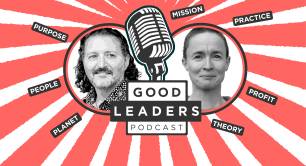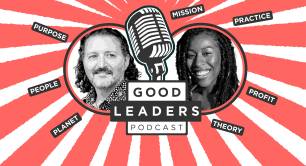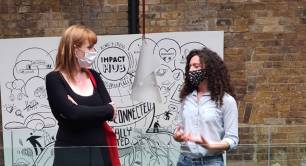Good Leaders Podcast Episode 13 – Devi Clark: ‘We are not the ones feeding hungry kids, we are the ones that support the people feeding hungry kids’
Devi Clark, managing director of Impact Hub London, tells Tim West about the good and bad of running an impact-driven support organisation: from the legal benefits of developing a new building to the struggle of attracting investors when your impact is “powerful, but often indirect”.
Love podcasts? Don't miss out on ours! Catch up on all our podcasts and subscribe free on Apple Podcasts, Spotify or Soundcloud.
“Collaboration, community building and mutual support,” are the tenets that birthed the idea of Impact Hub, says Devi Clark, managing director of Impact Hub London, an organisation that provides workspace and business support to social entrepreneurs in the UK’s capital.
Founded in 2005 by a visionary group of graduates from University World College Atlantic in Wales, it was the first of a global network of over 110 hubs that support social enterprises around the world, all of which, Devi says, are “rooted in their local communities”.
Impact Hub London just opened up its new workspace in Euston, central London, this month, an achievement Devi accredits to a mixture of its track record in creating impact, self-discipline and the Section 106 Agreement.
The ‘Section 106 Agreement’ refers to UK planning obligations agreed between a council and property developers under section 106 of the Town and Country Planning Act 1990. This legislation requires developers to mitigate the negative effects of the development on the local community and aim to make a positive contribution to their infrastructure.
Devi says: “It’s beautiful because under the Section 106 agreement, we’re required to do what we want to do, which is to create impact.”
Potential investors: don't waste our time
However, opening up a new building has not come without its struggles. While some shareholders have supported the organisation with “a really powerful blend of grants and loans”, such as Gordon Roddick, husband and business partner of the late Anita Roddick, founder of The Body Shop UK, Devi says investors pulling out delayed the process.
Her top piece of advice for investors who are considering investing in impact-led organisations, she says, is this: “Don’t string us along for a year and half… It’s better to just say no from the start rather than waste our time.”
Why was it so difficult for Impact Hub London to get investment for their new workspace? Devi says: “We are an umbrella organisation. We are not the ones feeding hungry kids, we are the ones that support the people feeding hungry kids. Our impact is powerful, but it’s often indirect, and sometimes that’s more challenging to make the impact case. People were going more for the direct, immediate needs.”
Growing up in a family “where a lot of people are interested in social impact” has influenced the trajectory of her career, Devi says. Having a grandfather who worked in a senior position at the NGO Unicef and a mother who was an editor at the New Internationalist magazine led her to perceive “thinking about social good” as “the norm”.
Born to a South Asian mother who was a refugee, Devi says that being a “half Asian, left-wing, Buddhist leaning agnostic” in “an area that was mostly white, right-wing and Christian”, shaped her experience as an “outsider”.
This later led her to create The Outsiders’ Network in 2014, a social enterprise that used articles, events and a forum to equip people who felt like outsiders with the confidence to drive social change. A year later, she joined Impact Hub London as their scaling manager.
Tim West talks to Devi about:
- How being a ‘big picture thinker’ has influenced her leadership style
- The power of ‘listening to your body and your mind’ to avoid burnout
- How joining a peer group of impact leaders has given her a safe space vent
- Why Archbishop Desmond Tutu’s emphasis on truth and reconciliation inspires her
- What has been her proudest moment
The next big thing on the cards for Impact Hub London, Devi says, is doubling down on its efforts to tackle the climate crisis by supporting more net zero businesses and circular economy approaches.
She says: “We really feel the urgency of the climate crisis, so we want to deepen the way that we engage with that. People who are often on the sharp end of it are so often the people who are not the entrepreneurs building the solutions, and we think that’s wrong.”
Thanks for reading Pioneers Post. As an entrepreneur or investor yourself, you'll know that producing quality work doesn't come free. We rely on our subscribers to sustain our journalism – so if you think it's worth having an independent, specialist media platform that covers social enterprise stories, please consider subscribing. You'll also be buying social: Pioneers Post is a social enterprise itself, reinvesting all our profits into helping you do good business, better.




